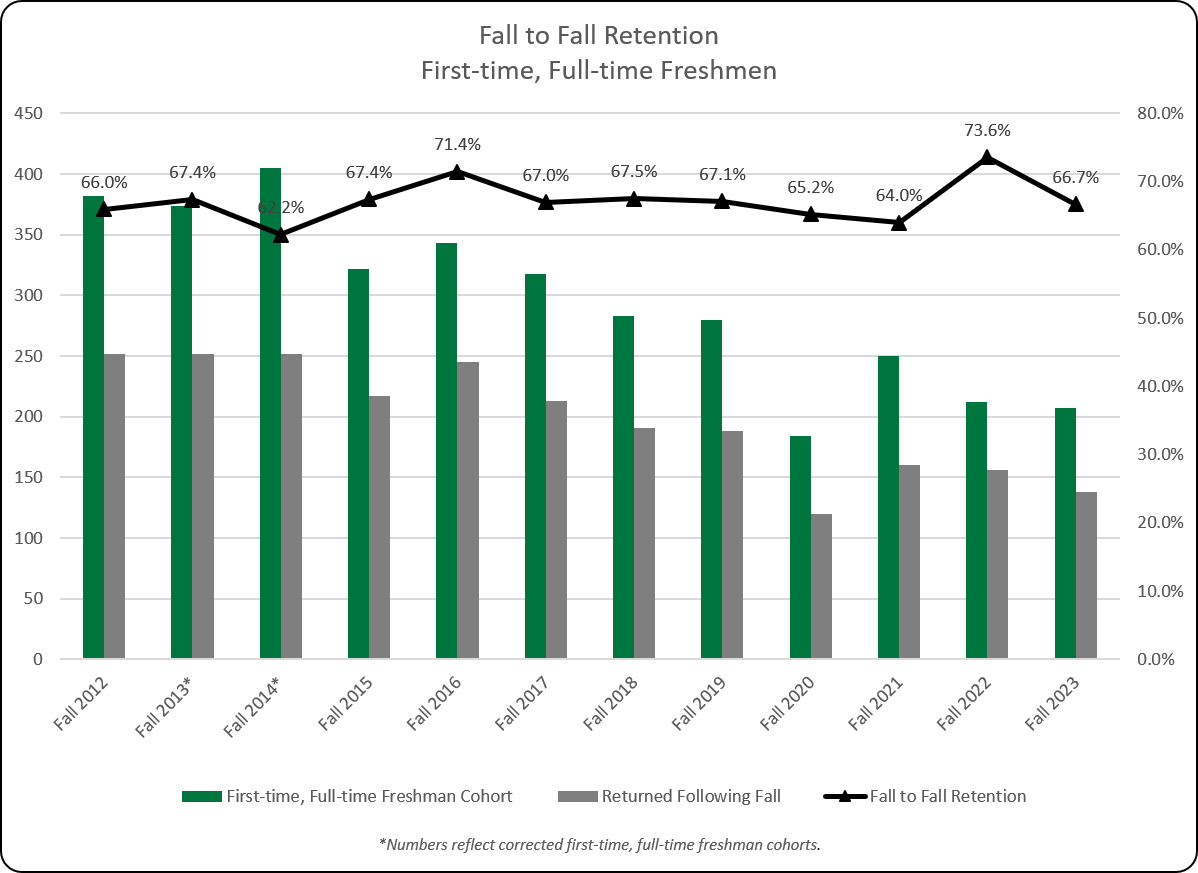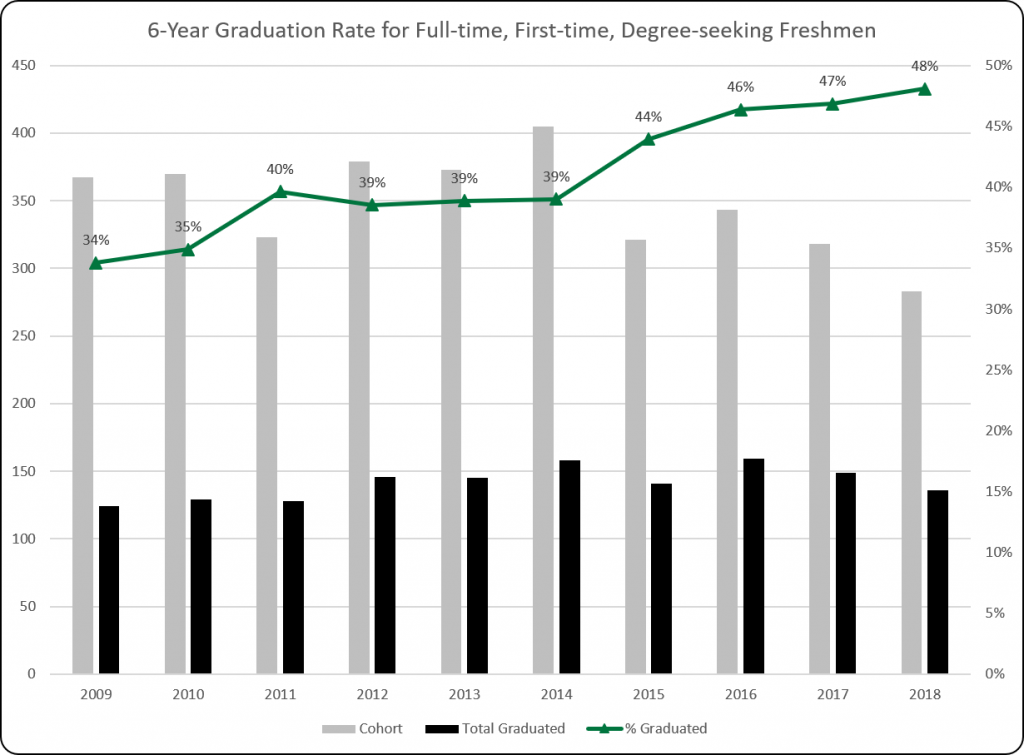Factbook Information
The Delta State University Factbook is an annual publication that provides a ready source of information to answer questions frequently asked about the University. Included is information, both past and present, concerning enrollment, students characteristics, faculty characteristics, revenue, and expenditures. Its primary purpose is to promote understanding for those seeking information about Delta State University.
IREP reserves the right to make edits as needed for changing data.
The Adobe Acrobat Reader must be used to view and/or print tables in the Delta State University Electronic Factbook. You can obtain a free copy of the Adobe Acrobat Reader by clicking here.
Mini Factbooks
2024-2025 Mini Factbook
2023-2024 Mini Factbook
2022-2023 Mini Factbook
2021-2022 Mini Factbook
2020-2021 Mini Factbook
2019-2020 Mini Factbook
2018-2019 Mini Factbook
2017-2018 Mini Factbook
2016-2017 Mini Factbook
2015-2016 Mini Factbook
2014-2015 Mini Factbook
2013-2014 Mini Factbook
2012-2013 Mini Factbook
Factbooks
2011-2012 Factbook
2010-2011 Factbook
2009-2010 Factbook
2008-2009 Factbook
2007-2008 Factbook
2006-2007 Factbook
Factbook Archive
Retention and Graduation Rates of First-time, Full-time Freshmen – 2009 cohort to present
Retention and Graduation Rates of First-time, Full-time Transfers – 2009 cohort to present
Graduation Rates
Goal: Maintain a 40% or above 6-year graduation rate, given attrition during the 2020 national pandemic and adjust the goal upward annually as year 1 to year 2 retention improves post-pandemic.
Retention
Goal: Increase the first-time, full-time freshman first year retention rate to 70% by 2027 (Fall 2026 cohort).

EAC Report Card – In 2010, the Education Achievement Council was created by the state legislature to bring Mississippi’s educational attainment and skill levels of the working-age population to the national average by 2025. The report cards show the progress that has been made toward educational goals for each university.
2022-2023 EAC Report Card
2021-2022 EAC Report Card
2020-2021 EAC Report Card
2019-2020 EAC Report Card
2018-2019 EAC Report Card
2017-2018 EAC Report Card
2016-2017 EAC Report Card
2015-2016 EAC Report Card
2014-2015 EAC Report Card
2013-2014 EAC Report Card
2012-2013 EAC Report Card
IHL System Profile – Contains a variety of financial and student data. It includes the previous year’s appropriations, total operating budget, and the following year’s budget request. It also includes faculty salary comparisons, enrollment, tuition and fee data, financial aid awards, and retention and graduation rates.
2018 IHL System Profile
2017 IHL System Profile
2016 IHL System Profile
2015 IHL System Profile
2014 IHL System Profile
Fall Enrollment FactBook – Details current fall enrollment data including on- and off-campus enrollment by ethnicity, gender, residency, degree program level, and program category.
2024 Fall FactBook
2023 Fall FactBook
2022 Fall FactBook
2021 Fall FactBook
2020 Fall FactBook
2019 Fall FactBook
2018 Fall FactBook
2017 Fall FactBook
2016 Fall FactBook
Fast Facts – Provides summary information on student enrollment, degrees awarded, average ACT score, and other statistics often requested of the eight public universities.
2024 Fast Facts
2023 Fast Facts
2022 Fast Facts
2021 Fast Facts
2020 Fast Facts
2019 Fast Facts
2018 Fast Facts
2017 Fast Facts
2016 Fast Facts
Degree Book – Includes a listing of all degree programs and degree levels at each institution, as approved by the Board of Trustees. It also includes an Academic Program Inventory listing various degree programs offered by the institutions.
2024 Degree Book
2023 Degree Book
2022 Degree Book
2021 Degree Book
2020 Degree Book
2019 Degree Book
2018 Degree Book
2017 Degree Book
2016 Degree Book
Research Catalog – Offers a consolidated profile of the research activities and sponsored projects being conducted by the eight universities and IHL Executive Office. It includes all external funding sources for the previous fiscal year.
FY2024 Research Catalog
FY2023 Research Catalog
FY2022 Research Catalog
FY2021 Research Catalog
FY2020 Research Catalog
FY2019 Research Catalog
FY2018 Research Catalog
FY2017 Research Catalog
FY2016 Research Catalog
IPEDS is the Integrated Postsecondary Education Data System. It is a system of interrelated surveys conducted annually by the U.S. Department of Education’s National Center for Education Statistics (NCES). IPEDS gathers information from every college, university, and technical and vocational institution that participates in the federal student financial aid programs. The Higher Education Act of 1965, as amended, requires that institutions that participate in federal student aid programs report data on enrollments, program completions, graduation rates, faculty and staff, finances, institutional prices, and student financial aid. These data are made available to students and parents through the College Navigator college search Web site and to researchers and others through the IPEDS Data Center. To learn more about IPEDS Survey components, visit https://nces.ed.gov/Ipeds/use-the-data/survey-components.
IPEDS Data Feedback Reports
The Data Feedback Report is intended to provide institutions a context for examining the data they submitted to IPEDS. The goal is to produce a report that is useful to institutional executives and that may help improve the quality and comparability of IPEDS data.
2024 IPEDS Data Feedback Report
2023 IPEDS Data Feedback Report
2022 IPEDS Data Feedback Report
2021 IPEDS Data Feedback Report
2020 IPEDS Data Feedback Report
2019 IPEDS Data Feedback Report
2018 IPEDS Data Feedback Report
2017 IPEDS Data Feedback Report
2016 IPEDS Data Feedback Report
2015 IPEDS Data Feedback Report
2014 IPEDS Data Feedback Report
2013 IPEDS Data Feedback Report


